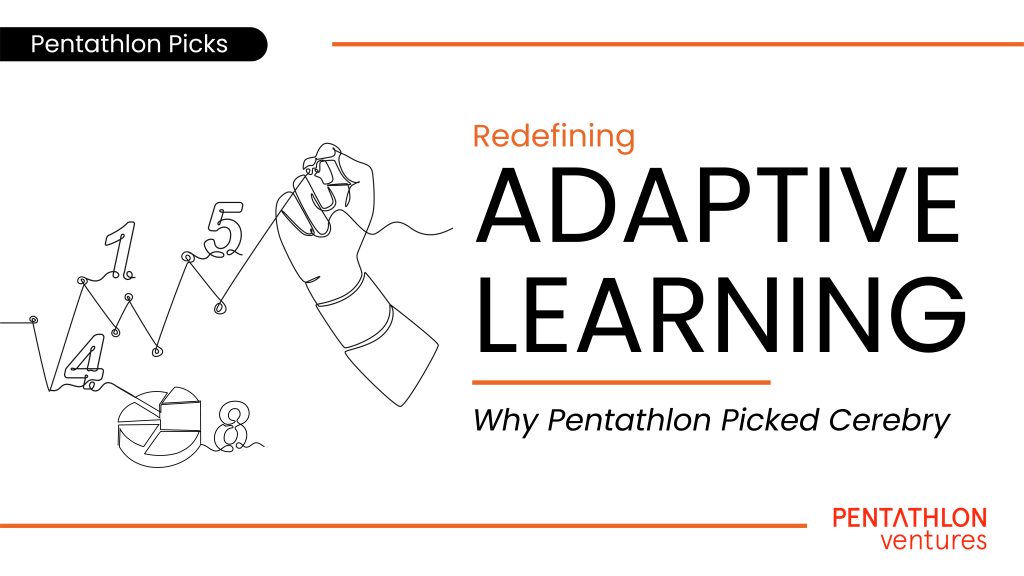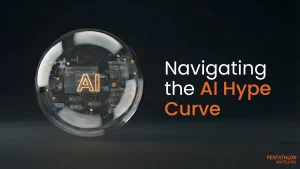All of us can relate to the fact that navigating the classroom exercises could be challenging when we find ourselves grappling with a subject in case of below-average proficiency. While some hesitate before voicing their struggle with the exercises, others approach the tutor’s desk or offline/online coaching separately to understand concepts again and probably get offered guidance tailored to their pace of understanding. The industry has seen a few alternate tech-led approaches to this problem in recent times but this is largely unsolved at the core. Also, the problem is much bigger when we look at the schools and test preparation industry.
We recently announced our investment in Cerebry, a technology to enable adaptive learning, starting with mathematics, across the education sector – schools, EdTech platforms, and test prep institutions.
When we first met Cerebry and the team, they stood out as one of the few deep IP-led companies combining a differentiated approach, an exceptional founding team, and a well-defined GTM. The founding team, consisting of Shubham, Rahul, and Rohit, comes from a deep technology and extensive research background and forms a well-rounded team, encompassing the diverse set of skill sets needed to build this rocketship. Shubham comes with a technology background and was previously CTO at one of the digital health and analytics companies. Rahul holds a PhD from NUS in “automated question generating framework” in the field of teaching and his thesis research is the starting point for the idea behind the venture. Rohit has more than 12+ years of experience in software engineering and was previously associated with Hike and Nagarro. Their ability to push the boundaries of technical breakthroughs, iterate, and experiment based on customer feedback, and translate them into a unique solution for a decade-old user-facing problem in the EdTech industry makes the opportunity more exciting.
Let’s first understand the problem statement we were talking about!
Further to the first paragraph, content production and delivery have remained a large operational focus in the education sector and scale can occasionally be limited by the substantial expense associated with manual content creation. A more important part of the problem is the approach which has largely remained at “one-size-fits-all” – providing practice exercises that are simply static, unchanging, and human-curated question banks. When the demand evolved to adaptive learning, the market response has been the shallow decision trees plugged into a set of questions. This is neither scalable nor offers a truly personalized experience for a student.
How is Cerebry approaching and solving the problem?
Cerebry generates “questions on the fly” and “No, this is not coming from a question bank”. Think of Cerebry as an automated question-generating engine that adapts to user proficiency. The product leverages domain knowledge such as facts and theorems, graphical representation of rules and objects (i.e. Point → Line → Triangle) and student progression to create dynamic learning journeys. They have begun with application in mathematics.
The core of their proposition at the user end – they unlock adaptive learning and enable personalised practice sets for each student depending upon their proficiency level. Based on the learner’s current proficiency, Cerebry’s engine automatically breaks down the problems into easier and smaller questions, covering the basic topics and concepts first, and gradually progressing towards the original one. The approach delivers a personalised learning experience through unique pathways and just-in-time feedback.
Application is not only limited to the schools but the broader education sector – schools, EdTech platforms and test preparation institutes. The product has started gaining acceptance into preparation for other national and international examinations such as CAT and GMAT, and the roadmap includes expanding to other subjects as well. Also, this could adapt to any syllabus and curriculum. They currently support English, Bahasa (Indonesia) and a few other languages with many more as part of the roadmap.
The company has received a lot of inbound interest and referrals. As part of the GTM, they also work with partners which include LMS providers and textbook publishers. This has proved to be one of the efficient channels to close deals. They also partnered with one of the governments in the emerging market to provide the infrastructure for running a nationwide competition and further, the ministry promoted it to all the public and private schools.
The company is currently working with 100+ customers which include schools, test preparation institutes, and leading B2B edtech ventures across Singapore, the Philippines, UAE and India. The platform currently has a user base of more than 30,000 globally.
The problem statement is critical, and looking at the numbers – the opportunity is much larger!
While globally the opportunity is huge, let’s dig into the Indian education sector to estimate the potential. There are 1.1M government schools 0.4M private schools, and private ones catering to a student base of 120M. 10% of them studying in the premium segment of schools and paying more than INR 2,500 in monthly school fees would be the right segment in context. Additionally, currently, there are 4,500 EdTech startups and many large-scale test prep coaching and institutions (i.e. TIME, IMS). We estimate the Indian market to be an opportunity for USD 500M+ and USD 6B+ global market, growing at approximately ~15%.
Looking at the adaptive EdTech ecosystem – companies are primarily leveraging the learner’s content engagement and historical preference data to deploy and train AI and enable adaptivity. Cerebry’s core differentiation comes from using deductive reasoning to generate questions on the fly, not the training-based approach. Some of the companies around the adaptive ecosystem include – Kidaptive, Acrobatiq, SmartSparrow and Knewton.
At Pentathlon, We are thrilled about Cerebry’s limitless potential as it scales. Over the past few months, we are witnessing great adoption around the world with monthly and daily active users scaling rapidly across the customers. We are fortunate to collaborate with the company as they build world-class products and businesses, and with great excitement look forward to our continued journey. To learn more about Cerebry, please visit their website (https://www.cerebry.co/ )




